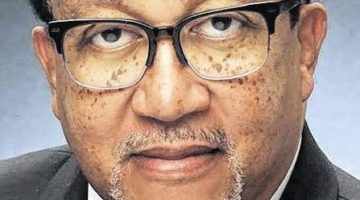 Civil rights activist Eula Gandy Johnson arrived in Fort Lauderdale in 1935 and soon decided that the Jim Crow laws in place needed to come to an end.
Civil rights activist Eula Gandy Johnson arrived in Fort Lauderdale in 1935 and soon decided that the Jim Crow laws in place needed to come to an end.
Known by many as the Rosa Parks of Broward County, Johnson made history on July 4, 1961 when she, along with Dr. Von Mizell and a group of black students from Dillard High School, became the first blacks to wade into the segregated waters of Fort Lauderdale beach.
The city of Fort Lauderdale later sued Johnson for being a public nuisance; Johnson won the case. A federal court ruled in her favor and against the city’s segregation policies.
Johnson, who fought against injustices as the first female president of the Fort Lauderdale NAACP from 1959 to 1967, will be among several women honored Saturday, April 12 at “Voices of Our Past,” a historic luncheon sponsored by the Pioneer Women of Fort Lauderdale (PWFL) in Dania Beach.
In an effort to preserve the honorees’ voices and experiences and share them with the community, the Fort Lauderdale Historical Society, prior to the women’s deaths, recorded their reminiscence of Broward County’s history and their related experiences, according to Judy Frost Clark, the event’s design chair.
“All of the women chosen for this event are important to Broward County,” she said. “Every year we have a different program. It’s not always about women, but it’s always centered on history.”
Founded in 1958, PWFL’s mission is to preserve and promote the community’s history and the descendants of the pioneers and women who have lived in Fort Lauderdale for more than 50 years.
Recorded voices and photographs of the women will be shared at the event, which will be PWFL’s 51st luncheon.
“My mother was born in 1906,” said Johnson’s daughter, Albertha Johnson, 82. “She was raised in Statenville, Georgia, a small town filled with prejudice. She resented the essence of racism and wanted to do everything she possibly could to make change.”
Albertha, a resident of Jacksonville, described Johnson as “a loving mother that focused on her children’s education. She was determined to make life good so that we could all make an honorable living and be treated with respect.”
A great businesswoman
Johnson’s grandson, Gregory Johnson, 59, of Tallahassee, recalled their only visit to the welfare office.
“The people there talked down to her so much that she walked out and never came back. She then took every job she could—cooking, sewing, domestic—until she became an entrepreneur,’’ he said. “She had a plan.’’
Johnson owned a small grocery store and two gas stations on Northwest Sixth Street, which is now Sistrunk Boulevard.
There were five black-owned gas stations on Sixth Street at that time, said George Burrows, 81, president of Burrows Electric in Fort Lauderdale.
Burrows said he wired Johnson’s gas stations for her.
Burrows, who won a 2008 African-American Achievers award last month from JM Family Enterprises for becoming Fort Lauderdale’s first black licensed master electrician in 1948, remembered Johnson as “an advocate for things we did not have, things we tried to get, sidewalks, street lights and voting rights. She really fought hard.”
Burrows also said Johnson’s organizing of the wade-ins at the beach was “dangerous, but Eula was strong like that; unafraid. More than anything, she really wanted us to get away from being considered second-class citizens, and always assuming that whites were first.”
Gregory Johnson said his grandmother was barely educated, but she was nevertheless a great business woman.
Johnson’s fight for civil rights and aggressive ways, according to Gregory, were not well received by certain whites in Fort Lauderdale who telephoned death threats often.
“We received them every night,” he said. “Once, we were attacked on Sunrise Boulevard because my skin is dark and my grandmother could pass for white. A group of whites asked her, ‘What are you doing with that little n—child?’ And when she replied, ‘That’s my son,’ we were beaten.”
Gregory said they lived in a shack on Sistrunk with a gas station out front, so the callers “could have bombed us at any time, the fire ravaging the area. But they never did. She was protected, it was God’s will.”
Throughout it all, Gregory said, Johnson never taught hate.
Stood by her people
There were several attempts made by whites to buy Johnson off, according to Gregory. She was promised that she would be allowed to “shop in certain places, eat in certain restaurants, have access to clubs, use the front doors at some establishments if she gave up fighting for the n— and quit the Civil Rights Movement.”
Gregory said that Johnson’s response was always the same: “I’ll come in the front door when I can come in with my people.’’
He added, “Eula Johnson was never a woman to compromise. For her, it was about the people and their quality of life.”
Many blacks in the community feared for Johnson’s safety, Gregory said, especially the men. On several occasions, members of the community begged her to “let it go,” and warned that her “boldness had angered whites, making things dangerous for her. They supported her, but were afraid for their own lives, the lives of their families.’’
They also feared losing their jobs, Gregory said.
Raised her grandson
Gregory said Johnson took him in at 6 months old and raised him as her own.
“She only asked one thing,’’ he said, “and that was to take care of her later and never put her in a home. Later, I remember her saying, ‘You kept your word.’’’
According to Gregory, Johnson also asked that he name something for her.
“I wanted it to be that part of A1A where she made a difference,” he said.
In 2001, the city of Fort Lauderdale renamed the length of Northwest 23rd Avenue between Northwest 19th Street and Sunrise Boulevard as Eula Johnson Avenue.
“Freedom is written in the hearts of black people,” Johnson said in a 1992 interview with The Miami Herald. “I had courage. But let's say this: When you are right and believe you are right, God gives you courage.”
Johnson died in January 2001 at age 94.
Other pioneering community leaders to be honored at Saturday’s luncheon are Camille Bryan Perry, founding daughter of the Himmarshee Chapter of the Daughters of the American Revolution; Ivy Cromartie Stranahan, pioneer community activist and first school teacher in Fort Lauderdale; Llewellyn Marshall,
First Lady of Fort Lauderdale; and Betty Mae Tiger Jumper, first female chief of the Seminole Tribe of Florida.
Cynthia Roby@Bellsouth.net
Photo courtesy of the Old Dillard Museum in Fort Lauderdale: Eula Gandy Johnson
IF YOU GO
WHAT: “Voices of Our Past”
WHEN: Saturday, April 12, 11:30 a.m.
WHERE: Tropical Acres Restaurant, 2500 Griffin Rd, Dania Beach
COST: $20
CONTACT: Judy Frost Clark, 954-564-2293












No Comment